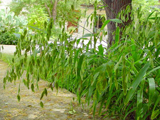Native Plants

Q. Who is Mr. Smarty Plants?
A: There are those who suspect Wildflower Center volunteers are the culpable and capable culprits. Yet, others think staff members play some, albeit small, role. You can torture us with your plant questions, but we will never reveal the Green Guru's secret identity.
Did you know you can access the Native Plant Information Network with your web-enabled smartphone?
Ask Mr. Smarty Plants is a free service provided by the staff and volunteers at the Lady Bird Johnson Wildflower Center.

rate this answer
Friday - April 24, 2009
From: Mobile, AL
Region: Southeast
Topic: Erosion Control, Grasses or Grass-like
Title: Plants for banks of a retention pond in Alabama
Answered by: Nan Hampton
QUESTION:
What can we plant on the inner and out walls of a detention pond to stop erosion? The pond is located in a neighborhood in Mobile, AL and the walls are 9 ft high with a steep slope.ANSWER:
If the banks are very steep you might want to consider using erosion-control blankets to stabilize the erosion area. The erosion-control fabric works by slowing the runoff water and allowing sediment to fall out rather than be washed away. Seeds are sown under the erosion-control material and grow up through the matting when they germinate. Underneath the matting the roots of the plants growing through the erosion-control material anchor the soil to stop the erosion. If you use erosion-control blankets made of biodegrable material, they will eventually disappear leaving the plants to control the problem.
Native grasses are an excellent choice for controlling erosion because they develop extensive fibrous root systems that hold the soil in place. Seeds can be sown under an erosion control blanket or grass plugs can be planted through the blanket. After the grasses have begun to establish themselves and stabilize the area you can add other plants. On the pond edge you could consider adding some attractive aquatic or semi-aquatic plants to help prevent the erosion.
GRASS/GRASS-LIKE
Andropogon glomeratus (bushy bluestem) is an attractive grass that does well in moist areas in full sun.
Andropogon virginicus (broomsedge bluestem) grows well in part shade in moist soils.
Panicum virgatum (switchgrass) grows in sun or part shade in dry to moist soils.
Carex blanda (eastern woodland sedge) will grow in sun, part shade or shade and in moist or dry soils.
Chasmanthium latifolium (Inland sea oats) is a very attractive grass that grows in part shade and shade in moist soils.
Typha latifolia (broadleaf cattail) will grow in sun or part shade at the edge of the pond in dry to wet soil.
Eleocharis montevidensis (sand spikerush) would grow well at the edge of the pond in wet or moist soil in the sun.
HERBACEOUS
Lobelia cardinalis (cardinalflower)
Helianthus angustifolius (swamp sunflower)
Conoclinium coelestinum (blue mistflower)
Hibiscus coccineus (scarlet rosemallow)
Itea virginica (Virginia sweetspire)
Lindera benzoin (northern spicebush)
More Erosion Control Questions
Shrub or Vine for NH Slope
May 11, 2013 - I'm looking for a native plant/shrub/vine that can be used to control erosion on a relatively steep slope in New Hampshire. Do you know of any?
view the full question and answer
Plants to prevent bank erosion in Georgia
January 20, 2009 - I NEED LIST OF PLANTS TO HELP PREVENT BANK EROSION. WE LIVE AT BOTTOM OF HILL THAT FURTHER SLOPES TO A POND. THE AREA IS SHADY AND WET FACING NORTHEAST. ANY RAIN CAUSES THE POND TO MUD UP. WE HAVE...
view the full question and answer
Erosion control plantings in Washington state
September 06, 2007 - Hi,
I am trying to do an eagle project that involves putting vegetation onto a hill to prevent erosion. I live in Washington state where there is plenty of rain so erosion is a big problem. We are t...
view the full question and answer
Plants to hold a slope in NY
May 17, 2010 - We recently built a house (on a hillside) and now are having some drainage issues on a fairly steep slope (a small creek is forming in the swale the excavator made "deal" with the drainage). Yester...
view the full question and answer
Plants for a property near a conservation area in MD
July 18, 2011 - Can you tell me what native plants and the type of landscaping that would be good to plant in front of a forest conservation area that is on a steep hill behind our future house? It is located in Manc...
view the full question and answer
| Support the Wildflower Center by Donating Online or Becoming a Member today. |

